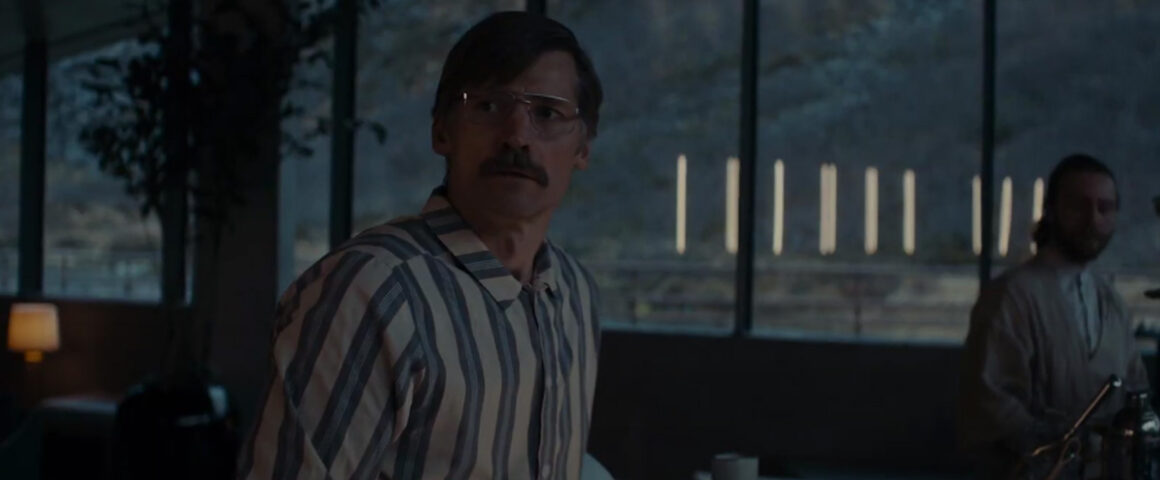Nikolaj Coster-Waldau (“Gods of Egypt”) stars as Max, an insurance detective with a growing tumor in his brain. As part of one of his investigations, Max discovers a place called The Aurora, sort of a bespoke-assisted-suicide facilitator. The place seems outwardly helpful but maintains quite the mysterious aura. What method does one wish for one’s demise? What setting? How about last meals or experiences? Nothing is too far out for The Aurora, but as anyone who’s seen “A Cure for Wellness” can tell you, what appears to be pristine and philanthropic often harbors ulterior motives.
The movie, Exit Plan, jumps forward and backward in time frequently. In the past, Max has an episode at work while consulting with a client — an episode that leads to his initial tumor diagnosis. At the behest of his doctor, Max alters his diet and exercise habits and is feeling sufficiently better in a few months that he announces to his wife Laerke (Tuva Novotny, “Annihilation”) plans to return to work — well, after one more CT scan. You can probably guess what the scan showed and whether Max stopped by the office afterwards.
Max begins to have an existential crisis. His destiny appears to be one of great suffering, and in his near future. He believes he cannot handle it, and given the severity of his situation, it’s easy to sympathize with him. He finds it very difficult to relay his new prognosis to Laerke and instead looks for ways he himself can end his pain. It quickly becomes apparent, though, that Max is no good at taking his own life, and that’s when he hears from the client with whom he was consulting when he had his initial episode. It seems the widow has received a video in the mail, a video from her (presumed) dead husband, in which the dead husband says he will soon be dead, thanks to the assistance of The Aurora and its fine staff.
The institute itself is nestled among the mountains of northern Norway, aside a river whose flow ranges from a trickle to raging. It’s cold and blustery outside, but inside is the height of luxury. The guests dispossess themselves of their material items, including their clothes, which they trade in for slimming pajamas. All of the food and drink (and there is plenty of variety) appears to be included in the admission price. But, naturally, all of this opulence comes with a different price tag: Once one is admitted to the “hotel,” one cannot back out of one’s final decision. No alterations, no take-backs.
For much of Exit Plan, the theme appears to be a confluence of impending death and the right to choose one’s own demise. Max must weigh his ultimate decision with the knowledge that his beloved Laerke will not know of his plans until she receives her own fateful explanatory video. Should he end his own pain just to pass some of it on to her? It’s interesting to watch Max grapple with his mortality, from his DIY attempts to his defeated resignation that perhaps The Aurora is better suited to the task.
But I couldn’t help but wonder, as the movie continued to ping-pong between Max’s past and present, where all of this was leading. Assisted suicide is an intriguing, albeit abstract, topic for a film, and with the film jumping so frequently in time it was hard to keep Max’s present whereabouts (and state of mind) straight. Was he actually having second thoughts? Is all of this a hallucination or a dream? Does Laerke actually know where he is? Is he going to perish after all?
Most of the ambiguity isn’t really Coster-Waldau’s fault, but he plays Max so inscrutably that it’s nearly impossible to figure out what’s going on in his head. Great actors can do quite a lot without opening their mouths, but here our leading man is difficult to read. Max’s state of mind is at the center of the plot, and we never really get a glimpse of it. To top it all off, the final 20-minutes or so see the film move more toward being a thriller — and by that time it was far too late to salvage anything. Exit Plan feels like a term paper that was turned in by a student who paid attention in only every other class and thus is missing critical elements that make the plot understandable, if not entertaining.



